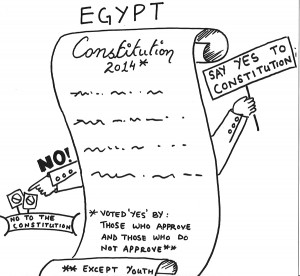Egypt must pursue democratic change
The past three years have been eventful for the Egyptian people. From the removal of former President Hosni Mubarak to the ousting of former Muslim Brotherhood political party leader and President Mohamed Morsi, chaos in Egypt appears to have no end in sight. Yet, on Jan. 14, the Egyptian people voted in favor of a new military-backed constitutional referendum, according to the Washington Post. Despite the overwhelming approval of the constitution and its improvements from previous constitutions, there is still much to be desired if Egypt is to flourish as a democracy.
Egypt’s Supreme Electoral Committee released the official result of the two-day referendum on Jan. 18, showing that 98.1 percent of the participants voted to approve the 2014 constitution, according to the Washington Post. The overall turnout was 38 percent, with 62 percent — many of whom are young voters — staying away from the polls. The new constitution included provisions the former constitution left out, including safeguards for women’s rights and religious freedom.
Though the poll results seem to represent the public’s desire to move away from the Muslim Brotherhood’s rule, the numbers’ representation of overall Egyptian opinion is questionable. Dissent against this new constitution, primarily by Muslim Brotherhood supporters, was limited by the military. Further, state-run and private news media echoed with endorsements of the charter, rarely giving voice to its critics. Whereas banners urging Egyptians to vote in favor of the new constitution were posted freely, hanging signs opposing the constitution was considered a crime.
Though the military is at fault for responding to Muslim Brotherhood protests with the use of violence, it is important to consider the actions of Muslim Brotherhood supporters after the removal of Morsi — a move supported by millions of Egyptians, according to the The New York Times. Muslim Brotherhood protestors participated in violent activities, including torching two government facilities in Giza. The military’s decision to fight violence with more violence, however, is counterproductive.
Since the fall of Mubarak, Egyptians have made no direct effort to establish a lasting democracy. Because Morsi and Muslim Brotherhood members in government solely focused on promoting radical and questionable interpretations of Islam, the seemingly democratic election of Morsi was anything but. During the election, Muslim Brotherhood party members were accused of taking advantage of and bribing many poor people to vote for them, resulting in a 52 percent approval rating for Morsi.
Though the removal of Morsi by the military was overwhelmingly supported by Egyptians, the manner in which he was removed is a testament to the fact that democracy was not achieved through his presidency. Rather than leave leadership to the military, another election with new political parties should be held to finally lead the Egyptian people to democracy and unity.
The youth of Egypt are the key to moving Egypt forward. The state must attract and include the youth who did not join the polls to bring Egypt back to its feet. Investing in the young people of Egypt is the country’s best bet for bringing back Egypt’s glory days, bringing people together and fixing a broken nation.
Egypt is in shambles because of old ways of thought. New knowledge and new leadership not associated with the military or the Muslim Brotherhood are necessary for Egypt to finally make a truly democratic transition — and it is up to the Egyptian youth to answer this call.
Yasmeen Kamel is a freshman majoring in business administration.


My brother suggested I would possibly like this blog.
He used to be entirely right. This put up actually made my day.
You cann’t consider just how much time I had spent for this info!
Thank you!
My head is literally going to explode if I read one more article about “achieving democracy in Islamic country______” fill in the blank.
When are we going to learn that Islam is incompatible with democracy. That Islam and Sharia law are co-joined at the hip and that Sharia law is fundamentally undemocratic.
Yasmeen why can you not see the obvious? There is not one single Muslim country where true democracy exists. There is not one Muslim country where non-Muslims are considered equals (which in itself is undemocratic). There is not one Muslim country where free speech and freedom of the press is respected. In fact even a country like Turkey which is considered a moderate Muslim country has imprisoned more journalists than all other countries in the world.
Yasmeen, as a Muslim I am amazed you do not understand your own religion.
Yasmeen idealistically calls for Egyptian youth to change their country. I am with Yasmeen, but it will not happen until Egypt undergoes a few more decades, if not more, of cultural evolution. The fellahin elected Morsi as their president, and they are the most numerous class in Egypt, not the sophisticated city dwellers. Egypt, and the rest of the Muslim world, are still in the grip of people who believe that their culture should be the same as in the time of the Prophet (peace be unto him). With that attitude, they are not yet ready to rule themselves, but need Mubarak, or Morsi, or Al-Sissi or another strongman.
Don,
I am afraid that unless Islam goes through a major reformation that democracy will never happen in Muslim dominated countries.
I would suggest the proof is in the pudding.
Islam and Sharia law can only exist together. One cannot exist without the other. Sharia law is profoundly undemocratic. Islam is at its roots undemocratic. Sorry, but true.